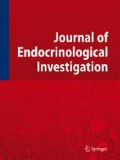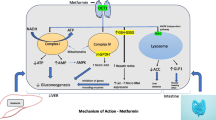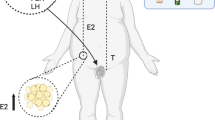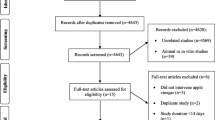Abstract
Purpose
Polycystic ovarian syndrome (PCOS) is one of the most common metabolic and endocrine disorders. Functional foods like pomegranate and probiotics are those that are considered to have beneficial effects on metabolic diseases beyond their basic nutritional value. So, we aimed to evaluate the effect of synbiotic pomegranate juice (SPJ) on cardiovascular risk factors on PCOS patients.
Methods
This was a randomized, triple-blinded, 8-week trial. Participants were randomly assigned to receive 300 mL/day of pomegranate juice (PJ), synbiotic beverage (SB), synbiotic pomegranate juice (SPJ), or placebo beverage (PB). Biochemical indices (lipid profile, Total Antioxidant Capacity (TAC), Malondialdehyde (MDA), high sensitive C-Reactive Protein (hs-CRP)) and blood pressure were assessed before and after the intervention.
Results
Participants in the PJ, SB, and SPJ groups experienced improvement in their lipid profile, oxidative stress, inflammation, and blood pressure during the time. Compared to placebo, Total Cholesterol (TC) was lower in the SB group (P < 0.01), LDL-c was lower in the SPJ and SB groups (P < 0.01), and HDL-c was higher in the SPJ and PJ groups (P < 0.01). With regards to oxidative stress and inflammation, when compared with placebo, MDA was lower in the SPJ, SB, and PJ groups (P < 0.001), TAC was increased in the SPJ and PJ groups (P\(<\) 0.001), and hs-CRP was decreased in the PJ group (P = 0.02). Blood pressure (BP) was lower in the SPJ and PJ groups compared to placebo (P < 0.001; P < 0.01, respectively).
Conclusions
Consuming daily SPJ for 8 weeks improved metabolic, oxidative, inflammatory, and BP outcomes in females with PCOS. This trial was registered in the Iranian Registry of Clinical Trials (IRCT20170207032439N2).

Similar content being viewed by others
References
Silva Dantas W et al (2013) Metabolic disturbance in PCOS: clinical and molecular effects on skeletal muscle tissue. Sci World J 2013:178364
Romanowski MD et al (2015) Prevalence of non-alcoholic fatty liver disease in women with polycystic ovary syndrome and its correlation with metabolic syndrome. Arq Gastroenterol 52(2):117–123
Tan S et al (2010) Large effects on body mass index and insulin resistance of fat mass and obesity associated gene (FTO) variants in patients with polycystic ovary syndrome (PCOS). BMC Med Genet 11(1):12
Tehrani FR et al (2011) The prevalence of polycystic ovary syndrome in a community sample of Iranian population: Iranian PCOS prevalence study. Reprod Biol Endocrinol 9(1):39
Diamanti-Kandarakis E, Dunaif A (2012) Insulin resistance and the polycystic ovary syndrome revisited: an update on mechanisms and implications. Endocr Rev 33(6):981–1030
Dahan M, Abbasi F, Reaven G (2019) Relationship between surrogate estimates and direct measurement of insulin resistance in women with polycystic ovary syndrome. J Endocrinol Invest 42(8):987–993
Ebrahimi-Mamaghani M et al (2015) Association of insulin resistance with lipid profile, metabolic syndrome, and hormonal aberrations in overweight or obese women with polycystic ovary syndrome. J Health Popul Nutr 33(1):157
Duleba AJ, Dokras A (2012) Is PCOS an inflammatory process? Fertil Steril 97(1):7–12
Radosh L (2009) Drug treatments for polycystic ovary syndrome. Am Fam Physician 79(8):671–676
Guo Y et al (2016) Association between polycystic ovary syndrome and gut microbiota. PLoS One 11(4):e0153196
Tremellen K, Pearce K (2012) Dysbiosis of gut microbiota (DOGMA)–a novel theory for the development of polycystic ovarian syndrome. Med Hypotheses 79(1):104–112
Rivera-Espinoza Y, Gallardo-Navarro Y (2010) Non-dairy probiotic products. Food Microbiol 27(1):1–11
Ooi L-G, Liong M-T (2010) Cholesterol-lowering effects of probiotics and prebiotics: a review of in vivo and in vitro findings. Int J Mol Sci 11(6):2499–2522
Ghanei N et al (2018) The probiotic supplementation reduced inflammation in polycystic ovary syndrome: a randomized, double-blind, placebo-controlled trial. J Funct Foods 42:306–311
Shamasbi SG et al (2018) The effect of resistant dextrin as a prebiotic on metabolic parameters and androgen level in women with polycystic ovarian syndrome: a randomized, triple-blind, controlled, clinical trial. Eur J Nutr 58(2):629–640
Karimi E et al (2018) Effects of synbiotic supplementation on metabolic parameters and apelin in women with polycystic ovary syndrome: a randomised double-blind placebo-controlled trial. Br J Nutr 119(4):398–406
Sohrab G et al (2014) Effects of pomegranate juice consumption on inflammatory markers in patients with type 2 diabetes: a randomized, placebo-controlled trial. J Res Med Sci 19(3):215
Bishayee A et al (2016) Pomegranate exerts chemoprevention of experimentally induced mammary tumorigenesis by suppression of cell proliferation and induction of apoptosis. Nutr Cancer 68(1):120–130
Kojadinovic MI et al (2017) Consumption of pomegranate juice decreases blood lipid peroxidation and levels of arachidonic acid in women with metabolic syndrome. J Sci Food Agric 97(6):1798–1804
Moazzen H, Alizadeh M (2017) Effects of pomegranate juice on cardiovascular risk factors in patients with metabolic syndrome: a double-blinded, randomized crossover controlled trial. Plant Foods Hum Nutr 72(2):126–133
Rom O et al (2017) Acrolein increases macrophage atherogenicity in association with gut microbiota remodeling in atherosclerotic mice: protective role for the polyphenol-rich pomegranate juice. Arch Toxicol 91(4):1709–1725
Seeram NP et al (2006) Pomegranate juice ellagitannin metabolites are present in human plasma and some persist in urine for up to 48 hours. J Nutr 136(10):2481–2485
Seeram NP, Lee R, Heber D (2004) Bioavailability of ellagic acid in human plasma after consumption of ellagitannins from pomegranate (Punica granatum L.) juice. Clinica Chimica Acta 348(1–2):63–68
Shukla M et al (2008) Bioavailable constituents/metabolites of pomegranate (Punica granatum L) preferentially inhibit COX2 activity ex vivo and IL-1beta-induced PGE 2 production in human chondrocytes in vitro. J Inflamm 5(1):9
Esmaeilinezhad Z et al (2019) Effect of synbiotic pomegranate juice on glycemic, sex hormone profile and anthropometric indices in PCOS: a randomized, triple blind, controlled trial. Nutr Metab Cardiovasc Dis 29(2):201–208
Bazarganipour F et al (2013) Health-related quality of life and its relationship with clinical symptoms among Iranian patients with polycystic ovarian syndrome. Iran J Reprod Med 11(5):371–378
Shoaei T, Heidari-Beni M, Tehrani HG (2015) Effects of probiotic supplementation on pancreatic β-cell function and c-reactive protein in women with polycystic ovary syndrome: a randomized double-blind placebo-controlled clinical trial. Int J Prev Med 6:27
Saghaei M (2004) Random allocation software for parallel group randomized trials. BMC Med Res Methodol 4(1):26
Tolić M-T et al (2015) Phenolic content, antioxidant capacity and quality of chokeberry (Aronia melanocarpa) products. Food Technol Biotechnol 53(2):171–179
Brand-Williams W, Cuvelier M-E, Berset C (1995) Use of a free radical method to evaluate antioxidant activity. LWT Food Sci Technol 28(1):25–30
Vujovic A et al (2010) Evaluation of different formulas for LDL-C calculation. Lipids Health Dis 9:27
Reitznerová A et al (2017) Lipid peroxidation process in meat and meat products: a comparison study of malondialdehyde determination between modified 2-Thiobarbituric acid spectrophotometric method and reverse-phase high-performance liquid chromatography. Molecules 22(11):1988
Kandiel MMM, El Khawagah ARM (2018) Evaluation of semen characteristics, oxidative stress, and biochemical indices in Arabian horses of different ages during the hot summer season. Iran J Vet Res 19(4):270–275
Wu Y et al (2017) Effect of probiotic Lactobacillus on lipid profile: a systematic review and meta-analysis of randomized, controlled trials. PLoS One 12(6):e0178868
Tajabadi-Ebrahimi M et al (2017) A randomized controlled clinical trial investigating the effect of synbiotic administration on markers of insulin metabolism and lipid profiles in overweight type 2 Diabetic patients with coronary heart disease. Exp Clin Endocrinol Diabetes 125(1):21–27
Eslamparast T et al (2014) Effects of synbiotic supplementation on insulin resistance in subjects with the metabolic syndrome: a randomised, double-blind, placebo-controlled pilot study. Br J Nutr 112(3):438–445
Rouhi SZT et al (2017) The effect of pomegranate fresh juice versus pomegranate seed powder on metabolic indices, lipid profile, inflammatory biomarkers, and the histopathology of pancreatic islets of Langerhans in streptozotocin-nicotinamide induced type 2 diabetic Sprague-Dawley rats. BMC Complement Altern Med 17:156
Salwe KJ et al (2015) Evaluation of antidiabetic, hypolipedimic and antioxidant activity of hydroalcoholic extract of leaves and fruit peel of Punica granatum in male Wistar albino rats. J Nat Sci Biol Med 6(1):56–62
Sadeghipour A et al (2014) Lipid lowering effect of Punica granatum L peel in high lipid diet fed male rats. Evid Based Complement Alternat Med 2014:432650
Esmaillzadeh A et al (2004) Concentrated pomegranate juice improves lipid profiles in diabetic patients with hyperlipidemia. J Med Food 7(3):305–308
Pasquali R, Gambineri A (2018) New perspectives on the definition and management of polycystic ovary syndrome. J Endocrinol Invest 41(10):1123–1135
Lye HS, Rusul G, Liong MT (2010) Removal of cholesterol by lactobacilli via incorporation and conversion to coprostanol. J Dairy Sci 93(4):1383–1392
Zou X et al (2014) Mitochondrial dysfunction in obesity-associated nonalcoholic fatty liver disease: the protective effects of pomegranate with its active component punicalagin. Antioxid Redox Signal 21(11):1557–1570
Murri M et al (2013) Circulating markers of oxidative stress and polycystic ovary syndrome (PCOS): a systematic review and meta-analysis. Human Reprod Update 19(3):268–288
Hosseini B et al (2016) Effects of pomegranate extract supplementation on inflammation in overweight and obese individuals: a randomized controlled clinical trial. Complement Ther Clin Pract 22:44–50
Fuster-Munoz E et al (2016) Effects of pomegranate juice in circulating parameters, cytokines, and oxidative stress markers in endurance-based athletes: a randomized controlled trial. Nutrition 32(5):539–545
Sohrab G et al (2015) Pomegranate (Punicagranatum) juice decreases lipid peroxidation, but has no effect on plasma advanced glycated end-products in adults with type 2 diabetes: a randomized double-blind clinical trial. Food Nutr Res 59:28551
Shishehbor F et al (2016) Effects of concentrated pomegranate juice on subclinical inflammation and cardiometabolic risk factors for type 2 diabetes: a quasi-experimental study. Int J Endocrinol Metab 14(1):e33835
Bahmani F et al (2016) The Consumption of synbiotic bread containing Lactobacillus sporogenes and inulin affects nitric oxide and malondialdehyde in patients with type 2 diabetes mellitus: randomized, double-blind, placebo-controlled trial. J Am Coll Nutr 35(6):506–513
Farrokhian A, Raygan F, Soltani A, Tajabadi-Ebrahimi M, Esfahani MS, Karami AA, Asemi Z (2019) The effects of synbiotic supplementation on carotid intima-media thickness, biomarkers of inflammation, and oxidative stress in people with overweight, diabetes, and coronary heart disease: a randomized, double-blind, placebo-controlled trial. Probiotics Antimicrob Proteins 11(1):133–142
Karamali M, Nasiri N, Shavazi NT, Jamilian M, Bahmani F, Tajabadi-Ebrahimi M, Asemi Z (2018) The effects of synbiotic supplementation onpregnancy outcomes in gestational diabetes. Probiotics Antimicrob Proteins 10(3):496–503
Sun W et al (2016) Pomegranate extract decreases oxidative stress and alleviates mitochondrial impairment by activating AMPK-Nrf2 in hypothalamic paraventricular nucleus of spontaneously hypertensive rats. Sci Rep 6:34246
Asemi Z et al (2014) Effects of synbiotic food consumption on metabolic status of diabetic patients: a double-blind randomized cross-over controlled clinical trial. Clin Nutr 33(2):198–203
Zamani B et al (2017) Synbiotic supplementation and the effects on clinical and metabolic responses in patients with rheumatoid arthritis: a randomised, double-blind, placebo-controlled trial. Br J Nutr 117(8):1095–1102
D’Souza A et al (2010) Effects of probiotics, prebiotics, and synbiotics on messenger RNA expression of caveolin-1, NOS, and genes regulating oxidative stress in the terminal ileum of formula-fed neonatal rats. Pediatr Res 67(5):526
Moazzen H, Alizadeh M (2017) Effects of pomegranate juice on cardiovascular risk factors in patients with metabolic syndrome: a double-blinded, randomized crossover controlled trial. Plant Foods Hum Nutr 72(2):126–133
Tajadadi-Ebrahimi M et al (2014) Effects of daily consumption of synbiotic bread on insulin metabolism and serum high-sensitivity C-reactive protein among diabetic patients: a double-blind, randomized, controlled clinical trial. Ann Nutr Metab 65(1):34–41
Mandal A, Bhatia D, Bishayee A (2017) Anti-inflammatory mechanism involved in pomegranate-mediated prevention of breast cancer: the role of NF-κB and Nrf2 signaling pathways. Nutrients 9(5):436
Scarinci E et al (2019) Increased fibulin-1 plasma levels in polycystic ovary syndrome (PCOS) patients: possible contribution to the link between PCOS and cardiovascular risk. J Endocrinol Invest 42(1):91–96
Shema-Didi L et al (2014) Does Pomegranate intake attenuate cardiovascular risk factors in hemodialysis patients? Nutr J 13:18
Stockton A et al (2017) Effect of pomegranate extract on blood pressure and anthropometry in adults: a double-blind placebo-controlled randomised clinical trial. J Nutr Sci 6:e39
Agerholm-Larsen L et al (2000) Effect of 8 week intake of probiotic milk products on risk factors for cardiovascular diseases. Eur J Clin Nutr 54(4):288–297
Naruszewicz M et al (2002) Effect of Lactobacillus plantarum 299v on cardiovascular disease risk factors in smokers. Am J Clin Nutr 76(6):1249–1255
Costabile A et al (2017) An in vivo assessment of the cholesterol-lowering efficacy of Lactobacillus plantarum ECGC 13110402 in normal to mildly hypercholesterolaemic adults. PLoS One 12(12):e0187964
Yap WB et al (2016) Lactobacillus casei strain C1 attenuates vascular changes in spontaneously hypertensive rats. Korean J Physiol Pharmacol 20(6):621–628
Acknowledgments
This study was supported by Shiraz University of Medical Sciences. The authors would like to thank the patients who participated in this trial.
Funding
The present article was extracted from the thesis written by Zahra Esmaeilinezhad. This article was financially supported by Shiraz University of Medical Sciences grants No12983. The author declared that they have no other relevant financial interest.
Author information
Authors and Affiliations
Corresponding author
Ethics declarations
Conflict of interest
The authors declare that they have no conflict ofinterest.
Ethical approval
This study was reviewed and approved by the ethics committee of Shiraz University of Medical Sciences in Iran and was registered in the Iranian registry of clinical trials (IRCT No.: IRCT20170207032439N2).
Informed consent
All participants provided written informed consent prior to enrolling in the study.
Additional information
Publisher's Note
Springer Nature remains neutral with regard to jurisdictional claims in published maps and institutional affiliations.
Rights and permissions
About this article
Cite this article
Esmaeilinezhad, Z., Barati-Boldaji, R., Brett, N.R. et al. The effect of synbiotics pomegranate juice on cardiovascular risk factors in PCOS patients: a randomized, triple-blinded, controlled trial. J Endocrinol Invest 43, 539–548 (2020). https://doi.org/10.1007/s40618-019-01139-x
Received:
Accepted:
Published:
Issue Date:
DOI: https://doi.org/10.1007/s40618-019-01139-x




